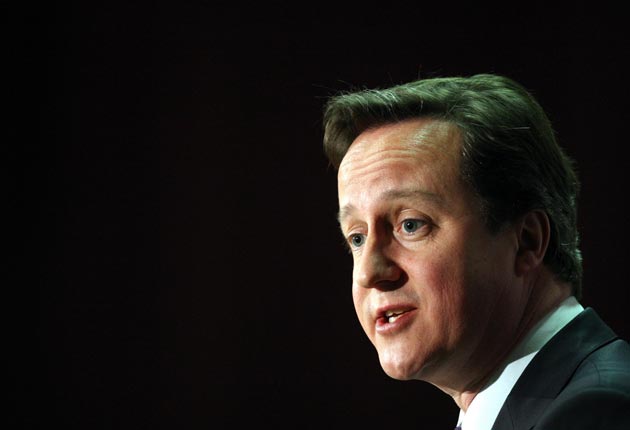Ties with Libya rebels strengthened

Your support helps us to tell the story
From reproductive rights to climate change to Big Tech, The Independent is on the ground when the story is developing. Whether it's investigating the financials of Elon Musk's pro-Trump PAC or producing our latest documentary, 'The A Word', which shines a light on the American women fighting for reproductive rights, we know how important it is to parse out the facts from the messaging.
At such a critical moment in US history, we need reporters on the ground. Your donation allows us to keep sending journalists to speak to both sides of the story.
The Independent is trusted by Americans across the entire political spectrum. And unlike many other quality news outlets, we choose not to lock Americans out of our reporting and analysis with paywalls. We believe quality journalism should be available to everyone, paid for by those who can afford it.
Your support makes all the difference.Britain today strengthened ties with Libyan rebel leaders and promised to increase military action against the regime of Muammar Gaddafi as fighting in the strife-torn country intensified.
Prime Minister David Cameron announced he had invited the rebels to establish a formal office in London.
He made the offer after holding talks with Mustafa Abdul Jalil, chairman of the Interim National Transitional Council, in Downing Street.
Foreign Secretary William Hague also held discussions with Mr Jalil, pledging afterwards that military action would be stepped up.
On the ground, Nato air strikes hit Gaddafi's sprawling compound in Tripoli and three other sites, hours after the Libyan leader was shown on state TV in his first appearance since his son was killed nearly two weeks ago.
The Ministry of Defence (MoD) said a British warship had taken part in action to stop inflatable boats used by the regime from mining the harbour at the besieged port of Misrata.
Mr Cameron said that as well as the rebels being invited to set up a London office, the UK presence in the rebel stronghold of Benghazi would be boosted, with specialists who would form the core of a team to advise the council on its longer term needs.
Britain was also completing plans to transfer several million pounds' worth of equipment to the police in Benghazi, and would help improve the council's public broadcasting capacity.
He said: "These steps continue our very clear intention to work with the council to ensure Libya has a safe and stable future, free from the tyranny of the Gaddafi regime."
Mr Hague, who pledged to step up military pressure on Gaddafi, said: "We are continuing to target Gaddafi's forces and command and control centres to protect civilians, and the UK will continue to push for this at Nato. The tempo of strikes and military pressure will continue to increase."
He said the situation in Libya remained one of "deep concern".
"But today's meetings have fuelled our faith that Libya will embrace a better future for its people."
He said he and Mr Jalil had discussed the continuing brutality inflicted on the Libyan people by Gaddafi.
"Gaddafi should realise that time is against him, and it is the council that is the legitimate interlocutor representing the Libyan people."
Inviting the council to open a mission in London was an important statement of "our engagement and commitment to deepening our relationship".
Further communications equipment, bullet-proof vests and uniforms would be provided to the civilian police authorities.
"All these items have been requested by the council," he added.
Mr Jalil told a news conference that the rebels still needed weapons in addition to non-lethal equipment such as the body armour and night vision goggles supplied by countries like Britain.
Fighters in Misrata had obtained some light arms, but more were needed to counter the heavy weaponry of Gaddafi's forces.
"We need light weapons, which is not equivalent to Gaddafi's weapons, but perhaps with courage, which the Libyans have, there may be some kind of balance," he said.
He announced earlier that he had invited Mr Cameron and Mr Hague to visit the rebels in Libya.
Explosions thundered across the capital Tripoli early today, and government officials and state-run television said the strikes targeted Bab al-Azaziya, Gaddafi's compound.
It has been frequently hit by air attacks including one on April 30 that killed his son, Seif al-Arab.
In an apparent effort to quash rumours that Gaddafi himself had been killed, state TV showed him meeting tribal leaders, but did not record him speaking. To authenticate the scene, the camera zoomed in on the date on a TV monitor in the room, which read Wednesday, May 11.
The last time Gaddafi had been seen in public was April 9.
The MoD said the destroyer HMS Liverpool fired at regime artillery on the coast at Misrata last night in an incident where high speed boats were apparently trying to mine the harbour.
Chief of the Defence Staff strategic communication officer Major General John Lorimer said: "The destroyer, while engaged on surveillance operations off the coast, was tasked with other Nato warships to intercept small high speed inflatable craft spotted approaching the port of Misrata - similar boats have previously been used by the regime to attempt to mine the harbour.
"The regime artillery on the coast fired an inaccurate salvo of rockets at Liverpool, whereupon she immediately returned fire, which silenced the shore battery.
"As a result of the prompt action by HMS Liverpool and the other Nato warships, Colonel Gaddafi's boats abandoned their operation."
Join our commenting forum
Join thought-provoking conversations, follow other Independent readers and see their replies
Comments